Spicy, rich and irresistibly aromatic. Chicken Tikka Masala is a British-Indian classic that is meal prep friendly, and wonderful with rice.

Time: 3/5
Your rice will have to wait for the gravy to be done, but it’s perfectly happy to do so
Effort: 3/5
Make a little or make a lot, it takes about the same effort
Much Ado About Curry
Chicken Tikka Masala is a British-Indian dish that probably owes some of its international renown to the imperial influence of its patron state. It doesn’t hurt that tasty chicken drenched in a flavourful gravy is such an intrinsically pleasurable thing either – something Japanese cuisine has assimilated and made its own.
I count myself as fortunate to grow up in a community with significant Indonesian, Indian, Nepali and Pakistani diasporas – I was spoiled for choice when it came to curries and spices, and I think this played into the development of my adventurous culinary spirit.
I say this a lot but it is worth repeating that stews and curries are great for meal prep because the quantities scale up well. It takes about the same amount of time and effort whether you’re making a little or a lot. The added bonus of an abundance of gravy to be sopped up by veggies and rice is nothing to sneeze at either!
I’ve tried many times to recreate the restaurant version of Chicken Tikka Masala. I’ve gotten close, but never quite perfect. That used to be disappointing, but I’ve since abandoned all hope of attaining perfect mimicry and this change in mindset has been very liberating.
Could I spend all afternoon making my own ginger garlic paste from scratch? Toast whole spices and grind them fresh? Pass tomato purée through a sieve to get rid of the seeds? I mean I could, but I have better things to do, you know?
As a home cook you have different resources and priorities, and adjusting your expectations is important to avoid going down the rabbit hole of super-gourmet, make-everything-from-scratch peer pressure that can really mess with your ability to feel satisfied with your own cooking. And that’s such a pity!
So here I am, at peace with my limitations, making a close approximation of Chicken Tikka Masala without any judgement, to be enjoyed by its own merit. Over rice, repeatedly, all week long. Oh, and in the unlikely event that you have some leftover curry sauce, save it and make yourself some quick Chicken Tikka Masala Tortilla Pizzas!
If you’re looking for even more freezer friendly curry recipes, go check out my posts on Malaysian style curry, Hong Kong style curry, and Japanese curry.

Dramatis Personae
Chicken – 100-200g per portion
Dark meat is definitely preferable if you have the calories to spare. However, I prefer white meat because the sauce is very rich and I want to balance that out.
I find tenderloins to be a more forgiving than breast. They come in smaller pieces, which makes it easier to cook the middle without drying out the outside. Even so, one would do well to avoid overcooking while searing, and returning the chicken to the sauce just before you wrap up. Beware that the chicken will cook further in the microwave if you reheat it, and it pays to leave the chicken a hair underdone if you can manage to time it right.
Marinade
Yogurt tenderises meat, and holds the spices close to the meat where the flavours can penetrate. I’ve talked about how magical yogurt is in a marinade, and the same applies here. You don’t need a lot though, just enough to coat the chicken in a thin layer. Start with a teaspoon and go from there.
Commercial garam masala powder is convenient, but check the label to make sure your blend doesn’t include salt. That way, you can control the salt level yourself. The flavours can be approximated with any combination of its constituents such as black pepper, cardamom, clove, cinnamon and cumin. How much you add is entirely to taste. Be aware that, like all spices, you will need more of it if it’s been sitting around for a while.
Kashmiri chili powder is the authentic choice when it comes to providing heat, but you can substitute it with a combination of paprika for colour and smokiness and any spicy chili powder such as cayenne. Again, quantity is completely to taste. Some trial and error will have you nailing it by the second or third try!
Sauce
The same spices in the marinade, plus the liberal addition of garlic, ginger and shallots make the gravy irresistibly aromatic. Ginger and garlic paste can also be bought at Indian grocers but can equally be produced yourself from fresh ginger and garlic and the liberal application of elbow grease. Shallots aren’t exactly traditional, but I had some to use up so in they go. The more the merrier, except maybe go light on the ginger if you’re a ginger novice.
You also want some sort of tomato product. Tomato paste is my favourite because of how convenient it is to brown and create even more complex flavours. Chopped or puréed tomatoes would work, but you’ll need to reduce the sauce a littAvoid the mistake (like I did in my earlier ventures) of adding a lot of tomato, as that would take the focus away from the spices.
Heavy cream gives the sauce richness, and combines with the redness of the tomato component to create a wonderful pink-orange colour. It is calorie-dense, so adjust according to your need. I substituted with coconut cream because I needed to clean out my fridge, and it brought floral and tropical notes to the party.
Sugar is important to round out all the other flavours present, which can be harsh. Add sparingly, and taste as you go.
How thick or thin you make your sauce is entirely up to you. Adjust the consistency with water or stock. Remember that it’s much easier to thin out a thick sauce than it is to reduce and thicken one.
Vegetables
Seeing as the sauce is quite rich, choose a vegetable pairing that is hearty enough to stand up to it. Cauliflower is a good choice because of its relatively neutral taste, and the florets have a lot of surface area to mop up the sauce.
Executive summary
- Marinade chicken overnight in yogurt and spices.
- Sear chicken in a pan until almost done. Cook vegetables and prepare sauce ingredients in parallel.
- Sauté aromatics and bloom the spices in hot oil.
- Add tomato paste to pan and let it brown a bit, then follow with water or broth.
- Reduce sauce to your liking. Add cream and sugar to taste.
- Return chicken to pan, toss to coat, and serve with rice.
Play by Play
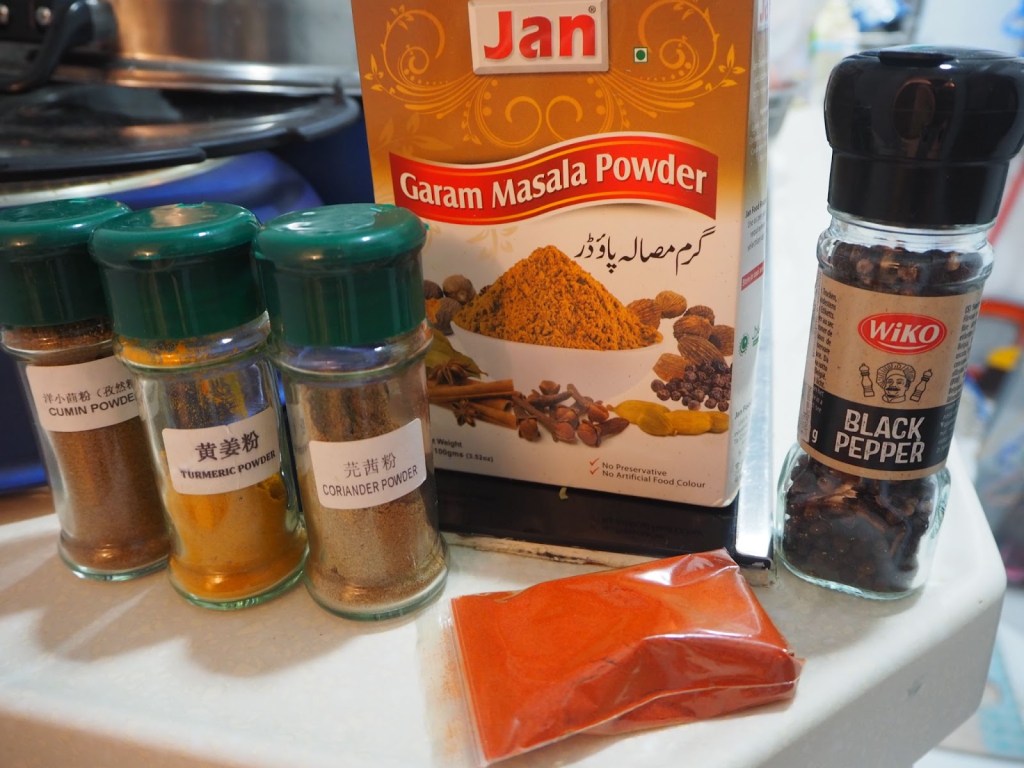
Spices assemble! The Garam Masala covers all the bases, but I had the other stuff lying around and just wanted to see what they would do in the recipe. Curries and braises are fun like that, there’s a lot of wiggle room to experiment with so you can make a recipe a hundred times in slightly different ways.

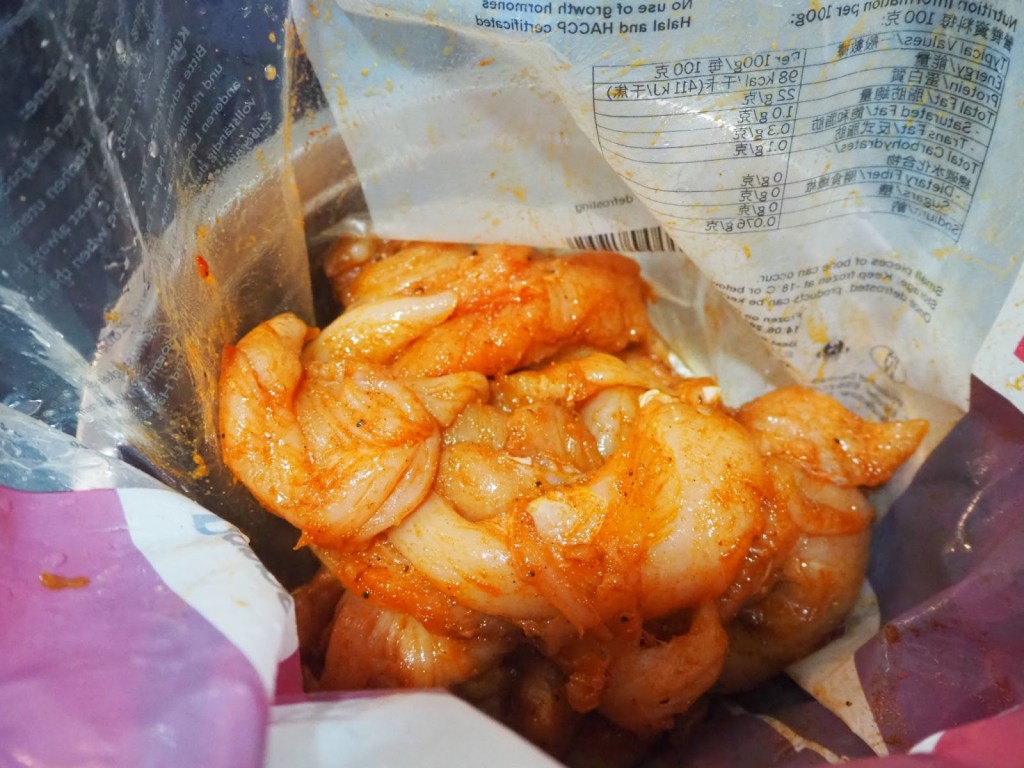
The chicken comes in a bag already, and I don’t see the point of dirtying another bowl to marinade it. Add the bare minimum amount of yogurt to coat the chicken. You need surprisingly little – it took only about a teaspoon for me to coat a kilogram of chicken tenderloins.

Don’t forget to wash your veg! Dirt and bugs can and do hide inside the florets.

Blanching would be my usual go-to method for cooking a large amount of vegetables but today I am in the mood for roasting. Here are the cauliflower oiled, salt-and-peppered, and waiting to go into the oven.


Searing the chicken. Watch the sides of the tenderloins intently, and flip when the whitish doneness creeps up to about halfway up each piece.
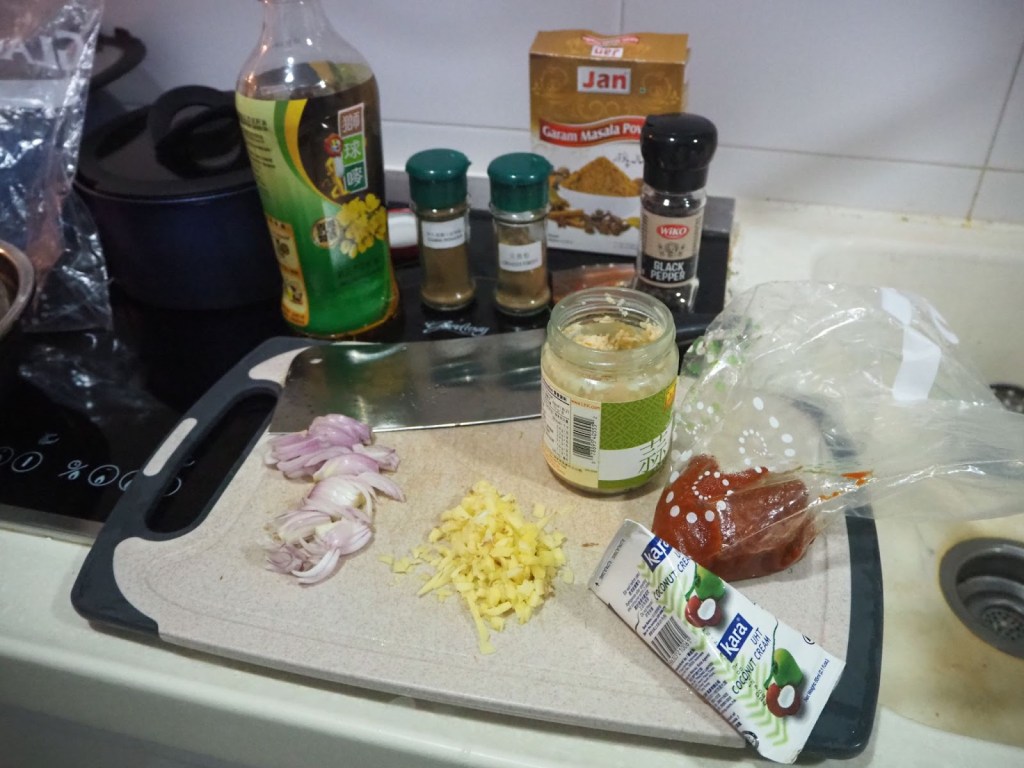
Here’s what I’ve been up to while the chicken was cooking. Aromatics chopped, spices at the ready, and garlic from a jar just because I wanted to see how it turns out.
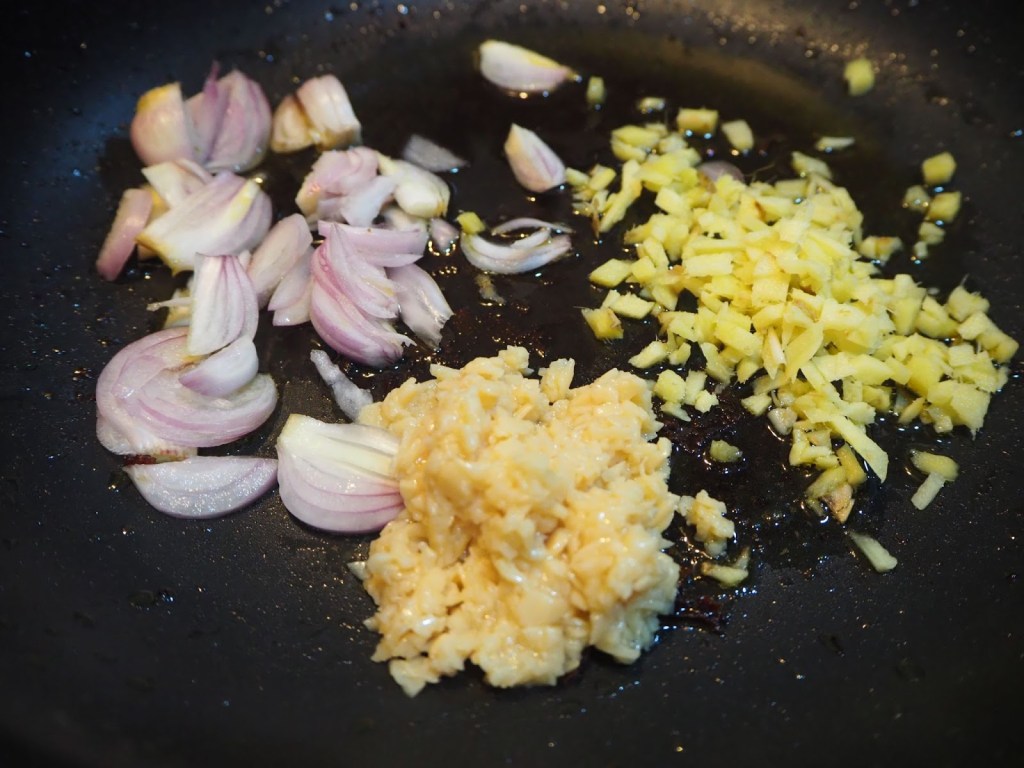
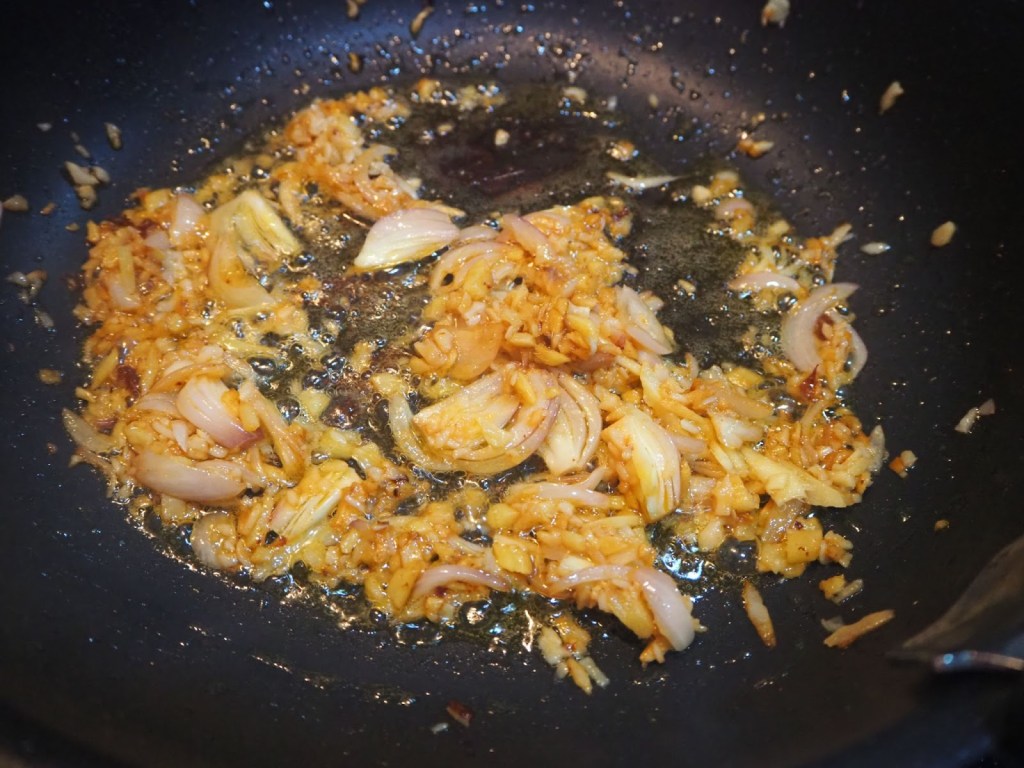
Begin with the aromatics. Sauté in hot oil until fragrant. Fingers crossed about the jarred garlic – there’s so much more going on that hopefully it won’t make much of a difference compared to fresh. After a while, toast the spices in the oil as well to release some of their delicious aromas.

The first batch of broccoli was done at this point. Out with the first batch, in with the second. Set the dial, then back over the stove.
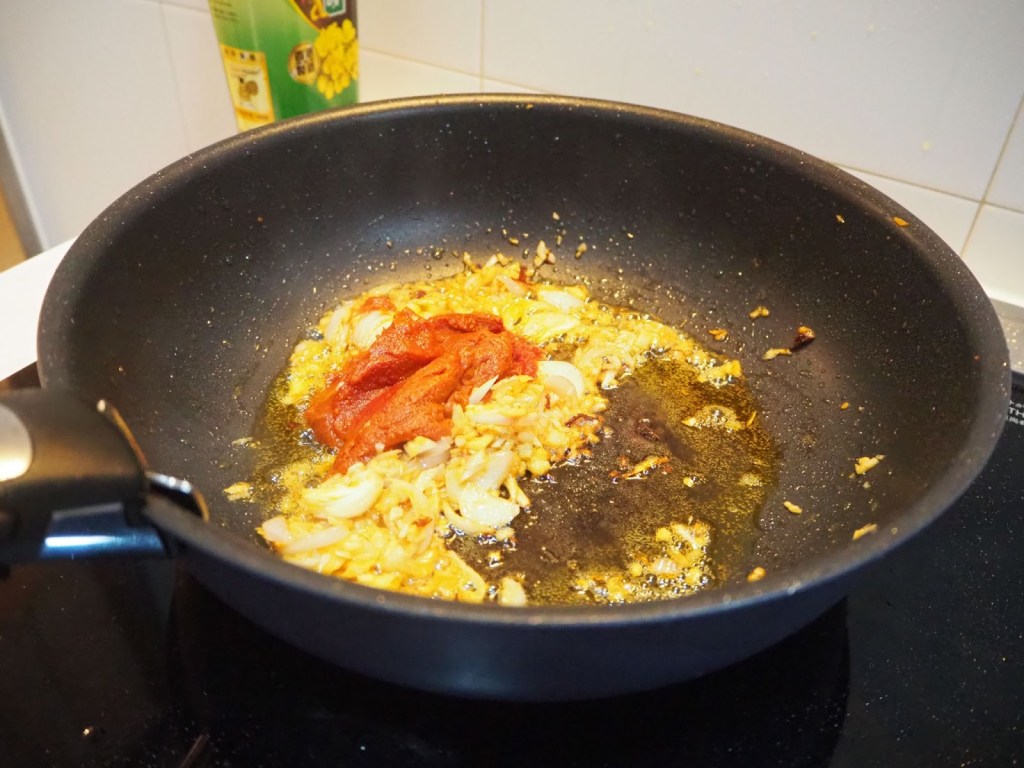

Let the tomato paste get some love in the hot oil. It develops toasty flavours if you let it sizzle a bit.

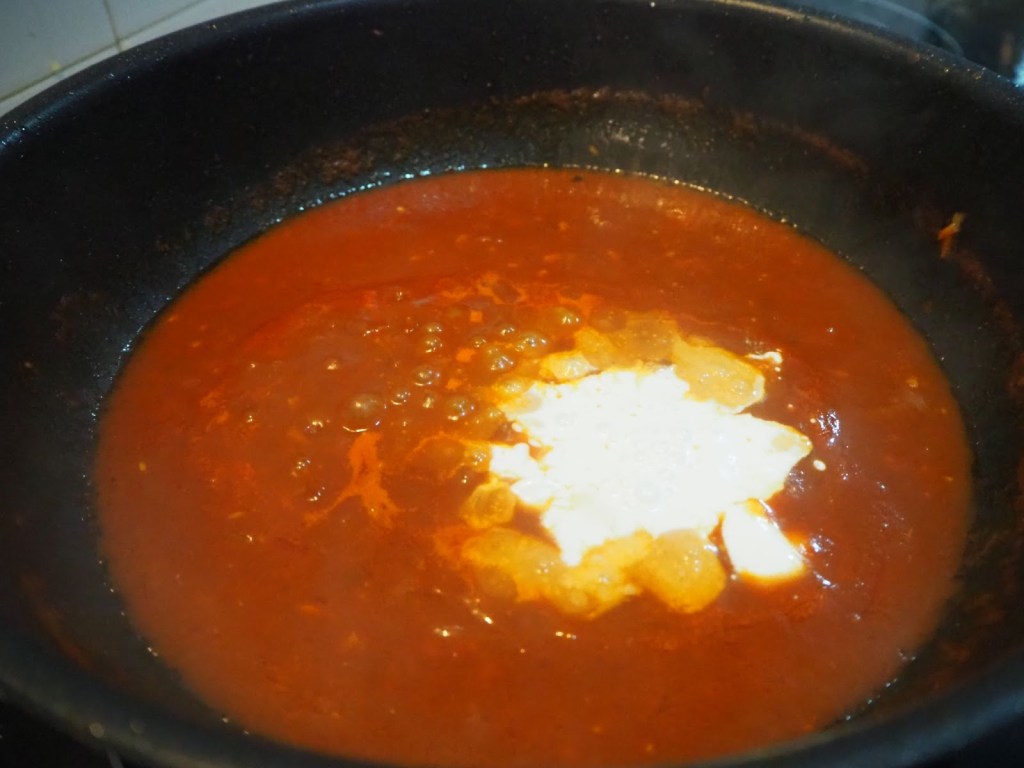
Add water or broth, reduce to your liking, then add sugar and a splash of cream. Stir in to combine, and adjust the sauce to your liking. More cream to make it more pink? More sugar to balance out the acidity and heat?


Bring the chicken tenders back into the fold and stir to combine. Don’t leave them in there for too long, they’re white meat and will suffer from overcooking.

Have I told you how much I love having leftovers?

Not the prettiest meal – a sprig of cilantro would go a long way to fixing that. But I’m not one to complain about chicken and sauce over rice. Mmmh …
Keep browsing by categories, or by tags:
Beef Blog Broccoli Cabbage Carrots Cast iron Cheese Chicken Curry Dashi Date Night Dried scallops Dried shrimp Eggs Fish and seafood Garlic Ginger Glass noodles Gochujang Honey Miso Napa cabbage Onion Oven Pasta Pork Potatoes Salmon Sesame oil Shiitake mushrooms Shrimp Soup Sous Vide Steaming Stewing Stir fry String beans Sweet potatoes Teriyaki Tofu Tomatoes Vacuum cooker Vegetarian Yogurt Zucchini

